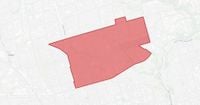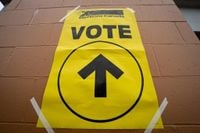It’s Election Day in Canada, and the stakes are high as the nation watches closely the outcomes of key ridings across the country. With at least 27 Jewish candidates vying for seats in the 2025 federal election, the political landscape is as diverse as it is competitive. The candidates represent all major parties, including the Conservatives, Liberals, NDP, People’s Party of Canada, Green Party, and Bloc Quebecois. Among them, the Conservatives field 10 candidates, the Liberals 7, the NDP 5, the People’s Party 2, the Greens 2, and the Bloc Quebecois 1.
In Mount Royal, incumbent Anthony Housefather faces a tough challenge from Conservative candidate Neil Oberman. Housefather has been under fire for his party's perceived anti-Israel stance, which has sparked significant controversy within the Jewish community. Meanwhile, in Toronto–St. Paul’s, Conservative Don Stewart, who narrowly won a by-election less than a year ago, is now battling Leslie Church for the Liberal Party, which hopes to reclaim a seat that has traditionally been a stronghold.
York Centre is another critical battleground, where Roman Baber, the Conservative candidate, is urging supporters to mobilize. In a recent social media video, he emphasized the importance of voting for him over Liberal MP Ya’ara Saks, who made history as the first Israeli-Canadian elected to Parliament. The riding has seen its share of unrest, with incidents of violence against Jewish establishments since October 7, raising the stakes even higher.
Polls indicate that the race in York Centre remains too close to call, with Saks holding a slight lead over Baber. The riding is notable for its significant Jewish population, and the implications of the election extend beyond party lines, as community leaders and Orthodox rabbis express their preferences for Conservative candidates.
In Thornhill, Deputy Conservative Leader Melissa Lantsman is widely expected to retain her seat against TV producer Leanne Kotler. Other notable races include Bruce Levy from the NDP in Toronto St. Paul’s, who is not expected to win, while Liberal MP Ben Carr is likely to hold his seat in Winnipeg.
As the election unfolds, the focus remains on key issues impacting voters. Many Jewish candidates have taken stances on Israel and antisemitism, reflecting the community's concerns amid rising tensions. Avi Lewis, running for the NDP in Vancouver Centre, and Dr. Samantha Green in Toronto Centre, have both supported boycott movements against Israel, which has drawn criticism from various factions within the Jewish community.
On the ground, the atmosphere is charged. In Mount Royal, Housefather has been relentless in his campaign, emphasizing his record and the importance of minority rights. Meanwhile, Oberman has capitalized on growing discontent among Jewish voters, who feel betrayed by the Liberal Party's shift away from traditional support for Israel.
Joel Ceausu, a correspondent for The CJN, noted that the campaign has been particularly heated, with both candidates engaging in fierce debates over issues such as antisemitism and government responses to recent violence. Housefather has faced accusations of being too lenient on the government’s handling of antisemitism, while Oberman has been criticized for his aggressive campaign style.
In Toronto, the dynamics shift as Jonathan Rothman reports from the downtown ridings. The race in Toronto–St. Paul’s has been particularly intense, given its history as a Liberal stronghold. Leslie Church, who lost to Stewart in the previous election by a narrow margin, is back in the fray, aiming to reclaim her seat. She has been vocal about the need for the Liberals to reconnect with voters, emphasizing issues like affordability and economic stability.
The Greater Toronto Area (GTA) is witnessing a crucial battle, with the Liberals projected to form the next government but facing significant challenges from the Conservatives. In the latest results, Jennifer McKelvie, a Liberal candidate, emerged victorious in Ajax, defeating Conservative Greg Brady. Similarly, Emma Harrison of the Liberals has won in Peterborough, defeating incumbent Conservative Michelle Ferreri.
As of late evening on April 28, 2025, results show the Liberals leading in 66 ridings across Ontario, while the Conservatives have claimed 56. Notably, the NDP has failed to secure any seats in the province, highlighting a shift in voter sentiment.
In Toronto Centre, Liberal candidate Evan Solomon has captured the seat, marking a significant win for the party as incumbent Marci Ien chose not to run again. This outcome reinforces the Liberals' dominance in the city, where they are expected to win nearly all seats, except for a few closely contested ridings.
The results from Toronto–St. Paul’s are particularly telling. With 210 out of 238 polls reporting, Church is projected to win decisively, garnering 60.02% of the vote compared to Stewart's 33.7%. This marks a significant turnaround for the Liberals, who lost the riding in a shocking byelection last summer.
As of now, the Liberals have 138 races called in their favor, while the Conservatives have 130. The Bloc Québécois and the NDP have also secured a few seats, but their overall performance remains underwhelming.
Looking forward, the implications of these results will shape the political landscape for years to come. The Jewish community's influence in this election has been palpable, with many candidates leveraging their connections to address community concerns. As the dust settles, it is clear that the 2025 federal election has not only been a test of party loyalty but also a reflection of the changing dynamics within Canadian society.
In conclusion, the election results signify a pivotal moment for Canadian politics, with the potential to reshape party strategies and community engagement in the years ahead. As voters continue to express their opinions through the ballot box, the implications for policy and representation will be felt across the nation.


